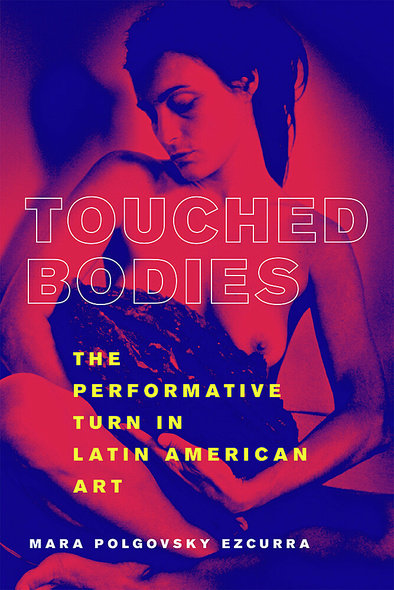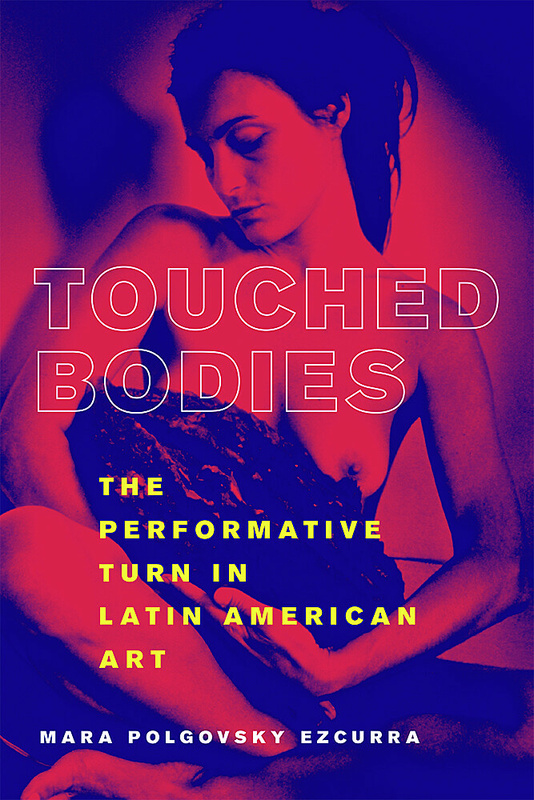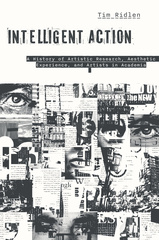
276 pages, 6 x 9
27 b-w images, 13 color
Paperback
Release Date:21 Jun 2019
ISBN:9781978802025
Hardcover
Release Date:21 Jun 2019
ISBN:9781978802032
Touched Bodies
The Performative Turn in Latin American Art
Rutgers University Press
Shortlisted for the 2020 Association for the Study of the Arts of the Present Book Prize
Winner of the 2019 Art Journal Prize from the College Art Association
What is the role of pleasure and pain in the politics of art? In Touched Bodies, Mara Polgovsky Ezcurra approaches this question as she examines the flourishing of live and intermedial performance in Latin America during times of authoritarianism and its significance during transitions to democracy. Based on original documents and innovative readings, her book brings politics and ethics to the discussion of artistic developments during the “long 1980s”. She describes the rise of performance art in the context of feminism, HIV-activism, and human right movements, taking a close look at the work of Diamela Eltit and Raúl Zurita from Chile, León Ferrari and Liliana Maresca from Argentina, and Marcos Kurtycz, the No Grupo art collective, and Proceso Pentágono from Mexico. The comparative study of the work of these artists attests to a performative turn in Latin American art during the 1980s that, like photography and film before, recast the artistic field as a whole, changing the ways in which we perceive art and understand its role in society.
Winner of the 2019 Art Journal Prize from the College Art Association
What is the role of pleasure and pain in the politics of art? In Touched Bodies, Mara Polgovsky Ezcurra approaches this question as she examines the flourishing of live and intermedial performance in Latin America during times of authoritarianism and its significance during transitions to democracy. Based on original documents and innovative readings, her book brings politics and ethics to the discussion of artistic developments during the “long 1980s”. She describes the rise of performance art in the context of feminism, HIV-activism, and human right movements, taking a close look at the work of Diamela Eltit and Raúl Zurita from Chile, León Ferrari and Liliana Maresca from Argentina, and Marcos Kurtycz, the No Grupo art collective, and Proceso Pentágono from Mexico. The comparative study of the work of these artists attests to a performative turn in Latin American art during the 1980s that, like photography and film before, recast the artistic field as a whole, changing the ways in which we perceive art and understand its role in society.
An astute and moving book, Touched Bodies gives account of the transition from an aesthetics of representation to an aesthetics of embodiment and bodily vulnerability in Latin American art of the 1980s. A contribution to aesthetic theory as much as to the history of art, Touched Bodies extends our understanding of performance-based art in relationship to practices of vulnerability, dissensus, and cross-temporal performativity.
Mara Polgovsky makes an outstanding contribution to the re-evaluation of the performative turn in adversarial art from 1970s and 1980s Latin America, expanding the genealogy of conceptualism and recalibrating the spectrum of body-centered practice. The originality of her approach provides unparalleled insights into the complex interaction between corporeality, political activism and the body as site of desire and vulnerability.'
Polgovsky’s book, which has already been shortlisted by the Association for the Study of the Arts of the Present for its 2020 Book Prize, brings to an international audience a series of artists who have broken the mould of Latin America’s default posture of political protest and produced works which sometimes condense the cry of despair in its barest expression by breaking down the gulf between their bodies and their work. She has brought to the project a remarkable combination of philosophical erudition and descriptive skill, plus the unstoppable curiosity of the best researchers. The book marks a turning point.
An astute and moving book, Touched Bodies gives account of the transition from an aesthetics of representation to an aesthetics of embodiment and bodily vulnerability in Latin American art of the 1980s. A contribution to aesthetic theory as much as to the history of art, Touched Bodies extends our understanding of performance-based art in relationship to practices of vulnerability, dissensus, and cross-temporal performativity.
Mara Polgovsky makes an outstanding contribution to the re-evaluation of the performative turn in adversarial art from 1970s and 1980s Latin America, expanding the genealogy of conceptualism and recalibrating the spectrum of body-centered practice. The originality of her approach provides unparalleled insights into the complex interaction between corporeality, political activism and the body as site of desire and vulnerability.'
Polgovsky’s book, which has already been shortlisted by the Association for the Study of the Arts of the Present for its 2020 Book Prize, brings to an international audience a series of artists who have broken the mould of Latin America’s default posture of political protest and produced works which sometimes condense the cry of despair in its barest expression by breaking down the gulf between their bodies and their work. She has brought to the project a remarkable combination of philosophical erudition and descriptive skill, plus the unstoppable curiosity of the best researchers. The book marks a turning point.
Mara Polgovsky Ezcurra is a lecturer in contemporary art at Birkbeck, University of London in the United Kingdom. She is coeditor of Sabotage Art: Politics and Iconoclasm in Contemporary Latin America.
Introduction
Corporeal calligraphies in times of change
The long 1980s: redefining the temporality of art
From curatorial to historical revisionism
Beyond the art of post-dictatorship
From memory studies to the aesthetics of dissensus
The performative turn
The ethics of performance
Overview of chapters
Chapter 1 – Writing the Body
A precarious aesthetic
A monstrous scene
Territories of excess
Sacrificial bodies
Neonic Obscenity
A mystical occasion
Sor Teresa, la Lumpérica
A corporeal rhetoric
The implicated self
Chapter 2 – Lamentations
Prayerful acts
Sky writing and the poetics of ambiguity
The new life
Song for his/her disappeared love
The politics of lamentation
Purgatory
Neither sorrow nor fear
(Un)godly fragments
Chapter 3 – Mē mou haptou: Touch, Ethics, and History
Waiting for Ariel
A political medium?
A tortured era
A glimpse into 1960s collage
Noli me tangere
Brailles
The haptic gaze
Never Again
Scenes from inferno
Pacem in terris
Chapter 4 – Nudities
Le féminin
Christs and mannequins
Divine phobia
Intimacy reawakened
A scourge from God?
Chapter 5 – Ritual and/of Violence
Potlatch
The scene of destruction
The scene of war
Mexico’s parodic guerrilla art
The scene of ritual
Liminal personae
The scene of terror
Letter bombing
The scene of the self
Exploding time
Chapter 6 – Cybernetics and Face-off Play
The hybrid face
The interface
Facial traces
The (post-)facial matrix
Conclusion
Touched bodies
The trace
Acknowledgments
List of References
List of Figures
Index
Corporeal calligraphies in times of change
The long 1980s: redefining the temporality of art
From curatorial to historical revisionism
Beyond the art of post-dictatorship
From memory studies to the aesthetics of dissensus
The performative turn
The ethics of performance
Overview of chapters
Chapter 1 – Writing the Body
A precarious aesthetic
A monstrous scene
Territories of excess
Sacrificial bodies
Neonic Obscenity
A mystical occasion
Sor Teresa, la Lumpérica
A corporeal rhetoric
The implicated self
Chapter 2 – Lamentations
Prayerful acts
Sky writing and the poetics of ambiguity
The new life
Song for his/her disappeared love
The politics of lamentation
Purgatory
Neither sorrow nor fear
(Un)godly fragments
Chapter 3 – Mē mou haptou: Touch, Ethics, and History
Waiting for Ariel
A political medium?
A tortured era
A glimpse into 1960s collage
Noli me tangere
Brailles
The haptic gaze
Never Again
Scenes from inferno
Pacem in terris
Chapter 4 – Nudities
Le féminin
Christs and mannequins
Divine phobia
Intimacy reawakened
A scourge from God?
Chapter 5 – Ritual and/of Violence
Potlatch
The scene of destruction
The scene of war
Mexico’s parodic guerrilla art
The scene of ritual
Liminal personae
The scene of terror
Letter bombing
The scene of the self
Exploding time
Chapter 6 – Cybernetics and Face-off Play
The hybrid face
The interface
Facial traces
The (post-)facial matrix
Conclusion
Touched bodies
The trace
Acknowledgments
List of References
List of Figures
Index





